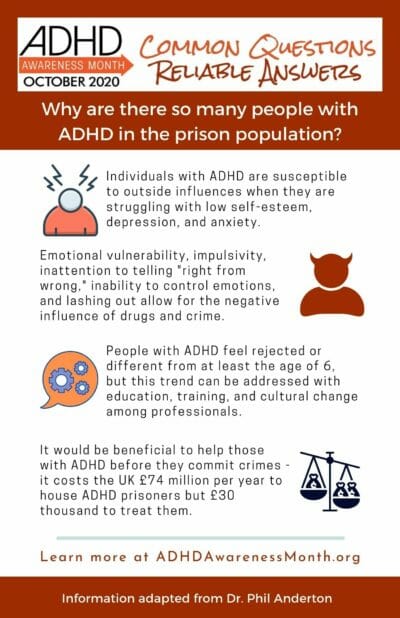We see people every day in clinic who are failing in life, whether that’s at school, college or work. It may be that they are struggling in their relationship or indeed they don’t have any. For this portion of our ADHD community, life is hard. Self-esteem can be incredibly low, depression and anxiety are common, and from those points forward, anything can influence the ADHD person’s life. If they are lucky they will have a positive influence, “a significant adult.” If they are unlucky, they can find friendship and solace inappropriately. When this happens, we find the vulnerability of these emotions allows a negative influence, drugs are tried, crime rewards their friendships, and maybe for the first time “I feel I fit in.” Add to this heady mix of emotional vulnerability some impulsivity, inattention to the many attempts to tell them what is “right from wrong” and always being the person with a “buzz” and energy, and, sadly, we can see the recipe for breaking our laws. We can go further and discuss controlling emotions and lashing out, as a child that may mean hitting a sibling, as an adult that could mean hitting another grown up, or damaging someone’s possessions.
We know that people with ADHD feel rejected and “different” from at least the age of 6. But we can reverse this trend with education, training, and cultural change amongst professionals who care and have responsibility for our children. And let’s be clear, this needs to happen now. ADHD is incredibly pervasive, it can cruelly destroy a bright future, and the damage to our economy if far greater than the investment needed to change things. It costs the UK a whopping £74million1 a year to house our ADHD prisoners it’ll cost about £30 thousand to treat them. Even if we invested heavily in training and support, even if we only halved the number in prison, there is no doubt we would make a huge difference. And as a final note, if we could divert those 10,000 people we could keep out of prison into being tax payers we would recoup the costs of doing this.
1 Costs per place and costs per prisoner by individual prison HM Prison & Probation Service Annual Report and Accounts 2017-18 Management Information Addendum Ministry of Justice Information Release
About the Author

Phil Anderton PhD entered the world of ADHD as a senior police officer in the UK, realising that the causation factors for young people entering the criminal justice system included neurodiversity and this was very much misunderstood, if considered at all. His work led to him publishing books, papers and addressing conferences worldwide. He was the first police officer to address the American Academy of Child & Adolescent Psychiatry and he trained police officers in the References between ADHD And crime across the USA and Europe. Since retiring from the police Phil has set up his own Healthcare Business, ADHD 360 Limited, and his company now manages a patient caseload of c600 patients from assessment through to treatment for their ADHD. Phil lives in rural England, works too hard and is married to Samantha, who incidentally is the person that insists he works too hard.

